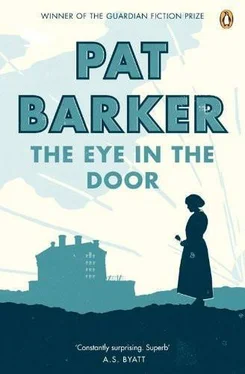‘I think if there are, we’ll meet them soon enough.’
Prior looked straight at Rivers. ‘I’m frightened.’
‘I know.’
When Prior finally left — it had been a long, exhausting session — Rivers switched off the desk lamp, went to sit in his armchair by the fire, and indulged in some concentrated, unobserved eye-rubbing. Did he do it ‘when something touched a nerve’? It was possible, he supposed. If there was a pattern, Prior would certainly have spotted it. On the other hand, Prior was equally capable of making the whole thing up.
He didn’t regret the decision to give Prior what he’d always claimed he wanted — to change places — because in the process he’d discovered an aspect of Prior that mightn’t have been uncovered in any other way. Not so much the ‘extra tuition’ — though that was interesting, particularly in view of Prior’s habit of aggressive flirtation — as the assumption that Rivers’s loss of visual memory must have some totally traumatic explanation. That had revealed more about Prior than he was aware of.
Though Prior had been a formidable interrogator. Whatever it was, you blinded yourself so you wouldn’t have to go on seeing it… You put your mind’s eye out . Simply by being rougher than any professional colleague would ever have been, Prior had brought him face to face with the full extent of his loss. People tended to assume he didn’t know what he’d lost, but that wasn’t true. He did know, or glimpsed at least. Once, in the Torres Straits, he’d attended a court held by the British official in collaboration with the native chiefs, and an old woman had given evidence about a dispute in which she was involved. As she spoke, she’d glanced from side to side, clearly reliving every detail of the events she was describing, and very obviously seeing people who were not present in court. And he had looked at her, this scrawny, half-naked, elderly, illiterate woman, and he had envied her. No doubt he’d encountered Europeans who had visual memories of equal power, but his own deficiency had never before been brought home to him with such force.
It was a loss, and he had long been aware of it, though he had been slow to connect it with the Brighton house experience. Slower still to recognize that the impact of the experience had gone beyond the loss of visual memory and had occasioned a deep split between the rational, analytical cast of his mind and his emotions. It was easy to overstate this: he had, after all, been subject to a form of education which is designed to inculcate precisely such a split, but he thought the division went deeper in him than it did in most men. It was almost as if the experience — whatever it was — had triggered an attempt at dissociation of personality, though, mercifully, not a successful one. Still, he had been, throughout most of his life, a deeply divided man, and though he would once have said that this division exercised little, if any, influence on his thinking, he had come to believe it had determined the direction of his research.
Many years after that initial unremembered experience, he and Henry Head had conducted an experiment together. The nerve supplying Head’s left forearm had been severed and sutured, and then over a period of five years they had traced the progress of regeneration. This had taken place in two phases. The first was characterized by a high threshold of sensation, though when the sensation was finally evoked it was, to use Head’s own word, ‘extreme’. In addition to this all-or-nothing quality, the sensation was difficult to localize. Sitting blindfold at the table, Head had been unable to locate the stimulus that was causing him such severe pain. This primitive form of innervation they called the protopathic. The second phase of regeneration-which they called the epicritic-followed some months later, and was characterized by the ability to make graduated responses and to locate the source of a stimulus precisely. As the epicritic level of innervation was restored, the lower, or protopathic, level was partially integrated with it and partially suppressed, so that the epicritic system carried out two functions: one, to help the organism adapt to its environment by supplying it with accurate information; the other, to suppress the protopathic, to keep the animal within leashed. Inevitably, as time went on, both words had acquired broader meanings, so that ‘epicritic’ came to stand for everything rational, ordered, cerebral, objective, while ‘protopathic’ referred to the emotional, the sensual, the chaotic, the primitive. In this way the experiment both reflected Rivers’s internal divisions and supplied him with a vocabulary in which to express them. He might almost have said with Henry Jekyll, It was on the moral side, and in my own person, that I learned to recognize the thorough and primitive duality of man; I saw that, of the two natures that contended in the field of my consciousness, even if I could rightly be said to be either, it was only because I was radically both …
It was odd how the term ‘Jekyll and Hyde’ had passed into the language, so that even people who had never read Stevenson’s story used the names as a shorthand for internal divisions. Prior spoke of looking at his hands to make sure they had not been transformed into the hairy hands of Hyde, and he was not alone in that. Every patient Rivers had ever had who suffered from a fugue state sooner or later referred to that state as ‘Hyde’, and generally this was a plea for reassurance. In a hospital setting, where the fugue state could be observed, such reassurance was easily given, but it was less easy to reassure Prior. Partly because the fugue state couldn’t be observed, but also because Prior’s sense of the darker side of his personality was unusually strong. He might talk about being incapable of sexual guilt, but, Rivers thought, he was deeply ashamed of his sadistic impulses, even frightened of them. He believed there were monsters on his map, and who was to say he was wrong?
There was one genuinely disturbing feature of the case: that odd business of making an appointment in the fugue state and keeping it in the normal state. It suggested the fugue state was capable of influencing Prior’s behaviour even when it was not present, in other words, that it was functioning as a co-consciousness. Not that a dual personality need develop even from that. He intended to make sure it didn’t. There would be no hypnosis, no artificial creation of dissociated states for experimental purposes, no encouraging Prior to think of the fugue state as an alternative self. Even so. It had to be remembered Prior was no mere bundle of symptoms, but an extremely complex personality with his own views on his condition. And his imagination was already at work, doing everything it could to transform the fugue state into a malignant double. He believed in the monsters — and whatever Rivers might decide to do, or refrain from doing — Prior’s belief in them would inevitably give them power.
‘Now I want you to draw me an elephant,’ Head said.
His voice distorted, as if he were blowing bubbles in soapy water, Lucas replied, ‘Yeth ah seen dom. Up. Uvver end.’
He took the notepad and pencil, and began to draw. Rivers was sitting beside Head, but neither of them spoke since Lucas’s concentration must not be disturbed. They had been doing the tests for half an hour and Lucas was already tired. His tongue protruded between his teeth, giving him the look of a small boy learning to read, except that, in Lucas’s case, the protrusion was permanent.
Rivers noticed Head looking at the shrapnel wound on Lucas’s shaved scalp, and knew he was thinking about the technical problems of duplicating this on the skull of the cadaver he’d been working on that morning. It was an interesting technique, Rivers thought. Head measured the dimensions of the wound on the living patient, then traced the outline on to the skull of a cadaver, drilled holes at regular intervals around the outline, and introduced a blue dye into the holes. The entire skull cap could then be lifted off and the brain structures underlying the dyed area dissected and identified. In this way the area of brain death could be correlated precisely with the nature of the patient’s language defects.
Читать дальше












